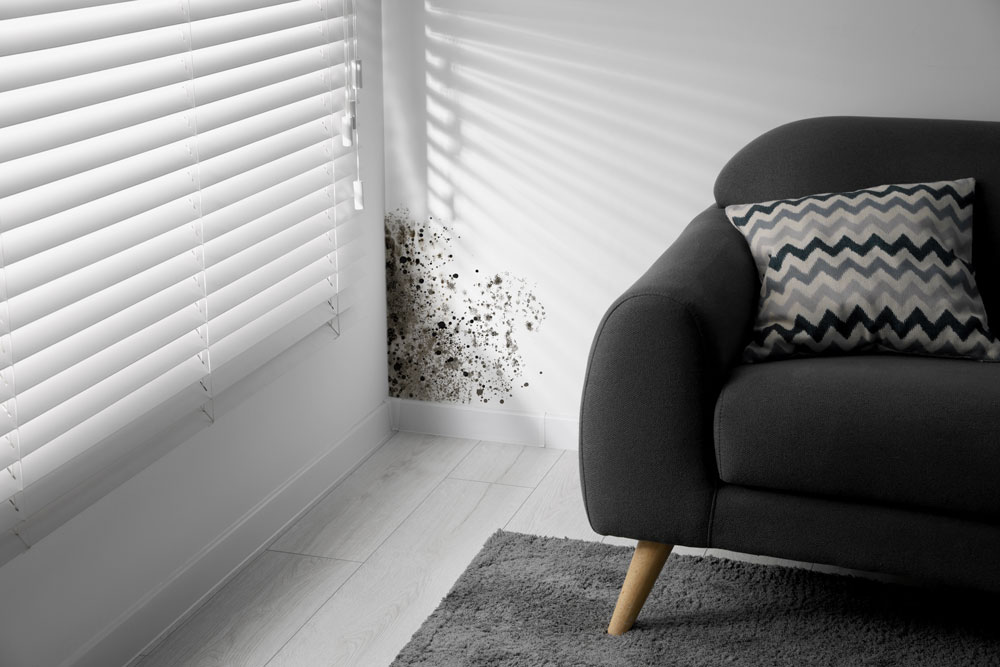Does Hydrogen Peroxide Kill Mould?
 CONTENTS
CONTENTS
- What is hydrogen peroxide?
- Can hydrogen peroxide kill mould?
- Why you should not use hydrogen peroxide to kill mould
- Always bring in professional cleaners for mould remediation
- Contact us today
Hydrogen peroxide (Hâ‚‚Oâ‚‚) has historically been used to treat wounds and cuts, and kill germs. But in modern times, it has also become a popular cleaning chemical for disinfecting surfaces and removing stains. Some even believe it can get rid of mould.
If you need mould removed from your property, ICE Cleaning can help. We offer thorough, long-lasting mould remediation services that come with a lifetime guarantee* should it return. Our mould specialists are available across the UK, round the clock, 365 days a year.
Keep reading to find out whether you can use hydrogen peroxide to kill mould.
*subject to advisories
What is hydrogen peroxide?
Hydrogen peroxide is a chemical compound that consists of hydrogen and oxygen. It acts as an oxidising agent which means it can oxidise the membrane of microorganisms like bacteria, viruses, and mould spores, as well as break down their proteins and DNA.
Most household products contain a concentration of 3% which can disinfect surfaces. Hydrogen peroxide is not just used for cleaning or medicinal purposes, however – it is a common ingredient in bleach, hair dyes, and cleansers.
Using hydrogen peroxide for mould removal is a particularly popular cleaning hack as it does not produce toxic fumes or a harmful residue, is inexpensive, and is easy to find.
But it can put people’s health at risk, particularly higher concentrations. If inhaled or ingested, or it gets on someone’s skin, it might cause problems including:
- Vomiting and gastrointestinal irritation
- Gastric distension and embolism
- Pulmonary and ocular irritation
- Burns and blisters
Can hydrogen peroxide kill mould?
While it can break down the mould’s essential components and therefore kill it, how effective it is for removing mould from the home is disputed.
Firstly, it can only kill mould on hard surfaces, like glass, counters, and walls. Mould on porous surfaces, like fabric, upholstered furniture, and wood is much harder to treat as it grows deep in the pores and can evade treatment.
It also cannot kill mycotoxins, the harmful substances mould occasionally produces which can trigger serious health problems.
3% hydrogen peroxide is not the optimal concentration to use for killing mould, too. Concentrations between 7% to 13.4% are proven to remove more mould faster but can be more dangerous.
A solution that gets rid of all the mould is critical as any spores left behind can cause it to quickly spread and grow back. Specialist cleaners will give you peace of mind that your mould problem is sorted.
It will not fix the underlying cause of the mould, either, so it could soon return after treatment. Mould remediation professionals can identify why mould is growing before removing it so they can advise on how to stop it coming back in the future.
Why you should not use hydrogen peroxide to kill mould
You must never attempt to clean mould yourself. Firstly, mould is dangerous to be exposed to without personal protective equipment (PPE) and cleaning it will bring you in close contact with it.
There is also a chance you will clean the mould incorrectly, such as scrubbing it, which can release spores into the air and encourage it to spread around the rest of the property.
As it is usually recommended you treat mould with hydrogen peroxide by spraying it on the affected area and scrubbing off the mould, it could make your mould problem worse.
If mixed with another cleaning chemical, it can create very harmful substances, as well. Hydrogen peroxide and vinegar, for example, make peracetic acid which can irritate eyes, skin, and the respiratory system.
It can even damage certain surfaces, like bleaching natural fabrics. You must remove all the hydrogen peroxide immediately after cleaning to protect your possessions.
Always bring in professional cleaners for mould remediation
They will already have the specialist products, equipment, and training to get rid of all the mould on the surfaces in the air. This includes mould growing deep in porous surfaces or in hard-to-reach areas like in vents or on the ceiling.
Mould specialists will also save you spending on new chemicals and tools that may not solve your mould problem. Our technicians only use safe, non-abrasive chemicals, as well, to protect your health.
Contact us today
As a corporate member of Dewpoint Professional, you can be sure our technicians are fully qualified to remediate mould in your home. In an emergency, they can be on site in a matter of hours.
To book our technicians for our mould removal services, call our team on 0208 066 0360 or send them an email at enquiries@icecleaning.co.uk.

Speak with me today,
I’m here to help
By asking you a few questions either via phone or email I can immediately provide a realistic estimation of the cost.
You’re in good company. We’ve cleaned for the following commercial clients… View all

Why choose us?
- Cater to a wide variety of cleaning situations
- Nationwide coverage, available 24/7
- Cater to commercial and domestic clients
- Free survey provided prior to quotation
- Emergency response team
- Offer a bespoke service designed to suit all your needs
- All technicians hold professional health and safety qualifications, including BICSc, IOSH, Dewpoint Professional & Safe Contractor
We’re fully accredited
We place best practise, professional expertise and health and safety at the core of our business. We’re fully compliant with all legal obligations. You can view a list of our accreditations below, or visit our Health & Safety page for more information.











-RGB-small.1707319151.jpg)




















